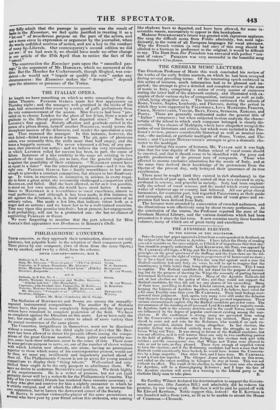THE GRESHAM MUSIC LECTURES.
THE Gresham Professor of Music this week concluded his review of the works of the early Italian masters, on which he had been occupied during several preceding terms. Of the interesting epoch embraced in this series of lectures, much information had to be gleaned and im- parted; the attempt to give a detailed and complete review of the state of music in Italy, comprising a notice of every master of eminence during the latter half of the sixteenth century, and illustrated with ex- amples of their various styles of composition, national as well as indi- vidual, being altogether new. The lectures embraced the schools of Rome, Venice, Naples, Lombardy, and Florence, during the period in which they were supported by PALESTRINA, LUCA MABENZ!O, FERETTI, CROCE, MONTEVERDE, Vrccur, BICCI, FESTA, STRIGGIO, ZARLINO, and PORTA. These are generally confounded under the general title of " Italian " composers ; but when subjected to close analysis, the charac- teristic of the school to which each composer belonged is clearly dis- cernible. Two classes of Madrigals, which have altogether escaped the notice of our historians and critics, but which were included in the Pro- fessor's review, possess considerable historical as well as musical inte- rest,—the national, or patriotic madrigals of Rome, Venice, and Flo- rence ; and CLAUDIO 3loyrEvEnim's attempts to give a dramatic cha- racter to the madrigal.
In concluding this course of lectures, Mr. TAYLOR said it was high time that the true dignity of the Italian school of vocal music should be asserted, and that it should cease to be identified with the puny and puerile productions of its present race of composers. Those who affected to assume exclusive admiration for the music of Italy, and at the same time derived their knowledge of its pretensions from the Operas of the present day, only betrayed their ignorance of its true excellencies.
These must lie sought (and they existed in rich abundance) in the Italian schools of past ages, which united all that yes elevated in style, profound in science, and graceful in melody. Italy had been emphati- cally the school of vocal science, and the model which every eminent writer of whatever age or country bad followed. All our great choral harmonists, for centuries past, had regarded PALESTRINA as their guide and exemplar, and, till of late years, our ideas of vocal grace and ex- pression had been derived from Italy. The lectures were attended by a succession of crowded audiences, and the illustrations were effectively sung by about twenty performers. At the conclusion of the course, the Professor reported the state of the Gresham Musical Library, acid the various donations which bad been presented to it since the last term. It now contains nearly three hundred volumes, many of which are of great rarity and excellence.


























 Previous page
Previous page